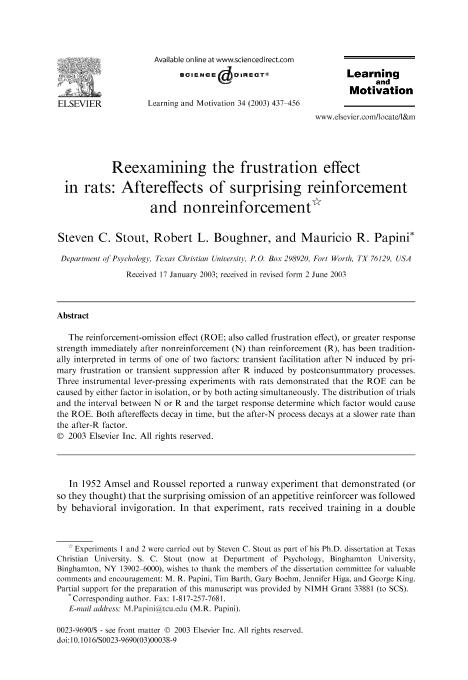Artículo
Reexamining the frustration effect in rats: aftereffects of the surprising presentation and omission of appetitive reinforcers on key-pecking performance in pigeons
Fecha de publicación:
07/2002
Editorial:
American Psychological Association
Revista:
Journal Of Experimental Psychology-animal Behavior Processes
ISSN:
0097-7403
e-ISSN:
1939-2184
Idioma:
Inglés
Tipo de recurso:
Artículo publicado
Clasificación temática:
Resumen
The reinforcement-omission effect (ROE), also known as frustration effect, refers to greater response strength immediately after nonreinforcement (N) than reinforcement (R). The ROE was traditionally interpreted as transient invigoration after N induced by primary frustration. Pigeons demonstrate similar ROEs whether outcomes are surprising (partial R) or expected (discrimination training) in runway (Experiment 1) and Skinner box situations (Experiments 2-3). Variations in the interval between N and the opportunity to respond indicate that the ROE results from an aftereffect of food consumption (Experiment 4). Increasing reinforcer magnitude increased the after-R effect, without modifying the after-N function (Experiment 5). These results are reviewed in the context of comparative research on spaced-trial successive negative contrast and related phenomena that have failed to appear in experiments involving nonmammalian vertebrates.
Archivos asociados
Licencia
Identificadores
Colecciones
Articulos(IBYME)
Articulos de INST.DE BIOLOGIA Y MEDICINA EXPERIMENTAL (I)
Articulos de INST.DE BIOLOGIA Y MEDICINA EXPERIMENTAL (I)
Citación
Papini, Mauricio Roberto; Boughner, Robert; Muzio, Ruben Nestor; Stout, Steven; Reexamining the frustration effect in rats: aftereffects of the surprising presentation and omission of appetitive reinforcers on key-pecking performance in pigeons; American Psychological Association; Journal Of Experimental Psychology-animal Behavior Processes; 28; 3; 7-2002; 242-256
Compartir
Altmétricas




